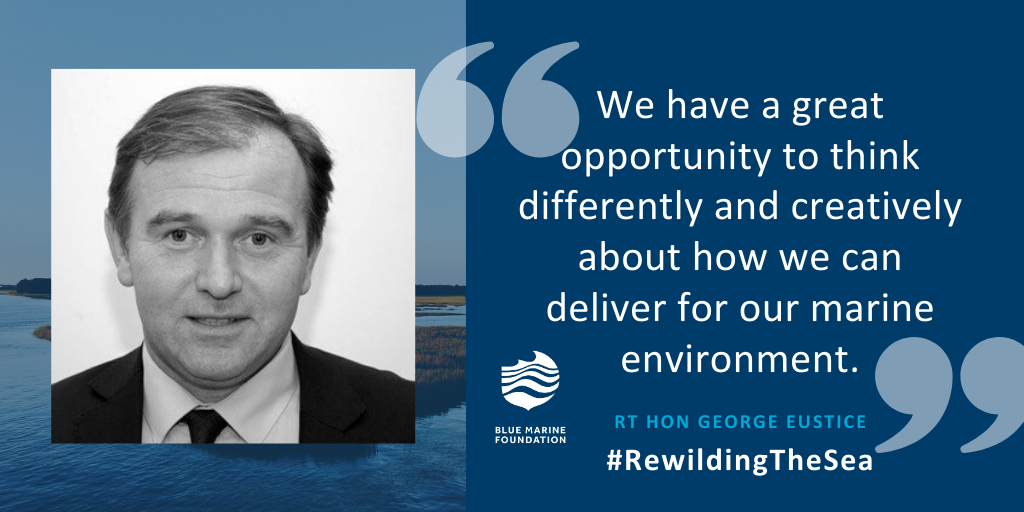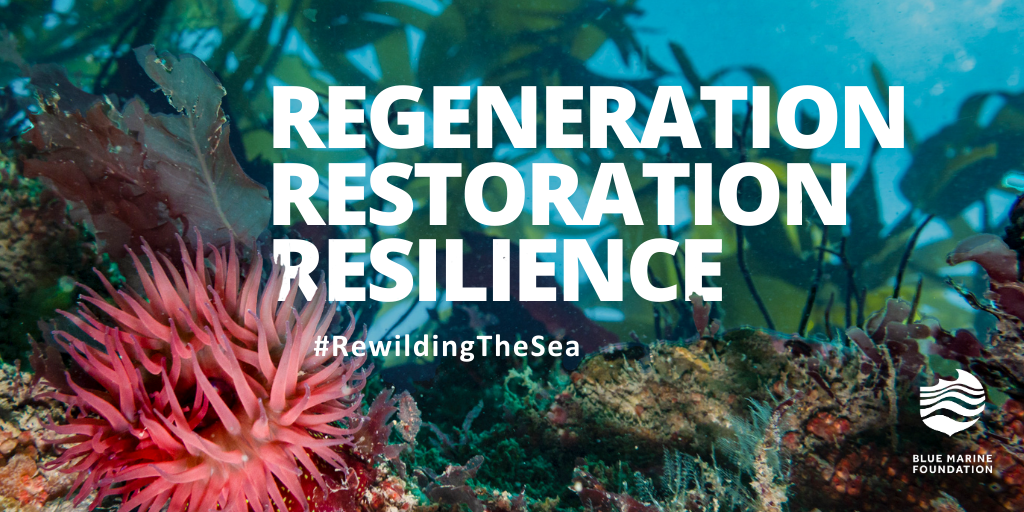The Rewilding the Sea conference report can be found here.
Protecting large areas of ocean will play a key role in capturing carbon emissions from the atmosphere, George Eustice, Environment Secretary, told Blue Marine Foundation’s conference entitled Rewilding the Sea.
Mr Eustice revealed that his department is considering restoring habitats such as seagrass and salt marsh and removing damaging activities including trawling and dredging from marine sediments, some of which, the conference heard, can capture up to five times the amount of carbon as peat bogs.
In his keynote speech to the online conference Mr Eustice also observed that leaving the EU would give the UK powers to manage its vast offshore marine protected areas – which are the size of England and Wales put together – for the first time. Under the EU, supposedly protected areas such as the Dogger Bank, have been heavily trawled and are regarded as “paper parks.”
Mr Eustice also said that the government was planning to allocate greater fishing opportunities, or quota, to inshore fishermen who often fished using more sustainable methods.
Mr Eustice shared his thinking on the climate conference, COP26, which the government is hosting next year. He said: “We have been very clear that we want biodiversity and the role of nature in addressing climate change to be a major part of that agenda. We also know that left alone to recover you get an abundance of life in these areas that are protected. Not only does that have a role in carbon sequestration but also in biodiversity.”
He commended the recently-published Benyon Review on Highly Protected Marine Areas as a “very powerful, very cogent report that describes the benefits of leaving areas alone and fully protecting them.”

He added: “You do get an abundance of life and spillover outside the area, in some cases more fish for the communities outside the area that has been protected.”
“This is a cultural change from the protected designations we have had in the past,” he said.
Mr Eustice, a Brexiteer who was formerly a member of UKIP before joining the Conservative party, said his critique of the EU during the referendum on membership was that there was “too much emphasis on lines on maps and too little emphasis on the management measures you need to get a recovery in nature.”
He said the flagship Bills now going through Parliament on Agriculture, Environment and Fisheries gave an opportunity “to really think differently and to think much more creatively about how we can deliver for our environment, including our marine environment.”
He added: “We will be requiring sustainable fishing activity as the quid pro quo for any UK or foreign vessel seeking access to our waters and once we regain control of our Exclusive Economic Zone it gives us much greater power to decide how we manage protected areas that are within it. So this is a very exciting time.”
The Government revealed this week in the House of Lords that its legal advice is that the right to fish is owned by the British public. This clarifies the law and overturns the impression that has built up over the past couple of decades that the quota traded by fishermen is a property right.
Mr Eustice was asked at the conference when the allocation of quota would be reformed accordingly to be fairer and to favour more environmentally friendly forms of fishing (all but 2 per cent of quota is owned by offshore vessels and 40 per cent is owned by foreign companies.)
He said: “We have said that any new fishing opportunities that come about as a result of our departure from the EU … will be reallocated by a different method. We have floated a number of suggestions. It could include putting a significant amount of quota into the inshore pool and some people have argued that smaller inshore vessels are more sustainable. There are counter arguments in that they are not always more sustainable because they are in a mixed fishery.
“Nevertheless, we are likely to try to increase the amount of fish available to those smaller vessels which sometimes have lower impacts. We also float the idea of licensing packages of quota to producer organisations but judging them on their attitude to compliance and sustainable fishing.”
“So there lots of exciting ways in which we can allocate quota differently once the transition period ends but I must stress that we won’t be doing things overnight because we need to keep some stability in the system.”
Blue Marine Foundation’s online conference, the whole morning session of which can be viewed here, was introduced by Prince Albert of Monaco, a long-time funder and advocate of ocean conservation. He said: “For decades, marine protected areas have proven that concern for nature can have positive effects on the economy, on the local economy with the promotion of sustainable activities and more generally on the regional economy, because we can see that by banning fishing in some areas, we have been able to regenerate fish stocks, thus give rise to productive fishing in the surrounding areas.”
Ben Goldsmith, a non-executive board member of the Department for the Environment, Food and Rural Affairs, said how much he had been influenced by George Monbiot’s book Feral, which quoted the novelist and playwright Oliver Goldsmith in 1776 on the arrival of the herring shoals as seen from the British shore:
“The fish were divided into distinct columns, of 5 or 6 miles in length, and 3 or 4 broad. While the water before them curls up, as if forced out of its bed, the whole water seems alive, and is seen so black with fish, to a great distance, that the number seems inexhaustible. The herring were followed by massive cod, spur dog, tope and smooth hound, longfin and bluefin tuna, blue, porbeagle, thresher, maiko and occasional great white sharks. Moving in behind within sight of the shore, where pods of fin whales and sperm whales.”
Mr Goldsmith added: “This astonishing congregation of life, has all but gone, largely through overfishing.”
The conference also heard from many other speakers, including Isabella Tree, author of Wilding; Prof Callum Roberts, who defined rewilding in the sea and Richard Benyon who said that “the political will exists” to create highly protected marine areas and “we are on a glide path to a better future.”
Among the many memorable images from the day were the pictures of Isabella Tree’s Knepp estate, a former arable prairie, from the air; the largest seagrass restoration project in the world, in the United States; the profusion of fish created by shoreline conservation schemes in Florida and protected areas in Mexico and a new project in wind farms in the North Sea which has installed “cod pipe reefs” where large fish can hide.
#RewildingTheSea




















